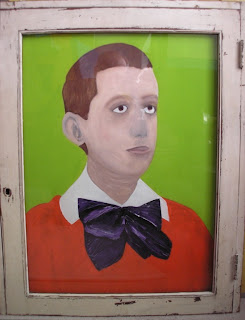"The day is not far off when the economic problem will take the back seat where it belongs, and the arena of the heart and the head will be occupied or reoccupied, by our real problems - the problems of life and of human relations, of creation and behavior and religion."
"The importance of money flows from it being a link between the present and the future."
"A study of the history of opinion is a necessary
preliminary to the emancipation of the mind"
John
Maynard Keynes.
Interested as well in other such topics like philosophy and literature, aside from economics, in the 1920s he was a member of the famous Bloomsbury group, that fascinating bunch of writers, philosophers and thinkers, together with Virginia Woolf, Lytton Strachey or EM Forster.
Keynes is considered by many to be the "savior" of capitalism after the Depression and WW II. After the disaster and destruction caused by the war, Keynes´s theories (if controversial) seemed to show the right path in the decades to come. Public spending was to fuel the economy. His main work, General Theory of Employment, Interest and Money first published in 1935, became some sort of Bible among many economists. His influence was huge, and Keynes´s approach was dominant well until the 1970s.
He was later replaced by a strong revival of liberalism in the 1980s. But now again, at this time of near depression that we are in, this economic doom that we constantly fail to leave behind, Keynes is once more vindicated. In Europe austerity and budget control reign supreme these days, even if those do not seem to fully work, according to some. Here is, in any case, another good chance to read what he had to say. Not only as an economist, but also as a thinker, in the deepest sense.
Perhaps one day, technology will be so powerful, economics so well managed, resources so abundant, that humankind will be at last, as J M Keynes himself suggested, to finally devote its energies to the "real problems" of our condition. But as that day is still far away, our real problems, we fear, are still what they have always been.
At
least in the Western World, we seem to be stuck in the middle of an irritating
never-ending economic crisis; and it has been so for a good five to six years.
Economics as a branch of culture and knowledge is the great topic of the day,
in terms of media, politics or academics. And economists have become nearly
celebrities. John Maynard Keynes (1883-1946) is one of the classic gods of the
economic firmament. He has traditionally been regarded by the general public as
an author somewhat half way between the two extreme social and economic
positions: rough liberalism and socialism. But actually he saved capitalism in the
second post war with his policies.
Interested as well in other such topics like philosophy and literature, aside from economics, in the 1920s he was a member of the famous Bloomsbury group, that fascinating bunch of writers, philosophers and thinkers, together with Virginia Woolf, Lytton Strachey or EM Forster.
Keynes is considered by many to be the "savior" of capitalism after the Depression and WW II. After the disaster and destruction caused by the war, Keynes´s theories (if controversial) seemed to show the right path in the decades to come. Public spending was to fuel the economy. His main work, General Theory of Employment, Interest and Money first published in 1935, became some sort of Bible among many economists. His influence was huge, and Keynes´s approach was dominant well until the 1970s.
He was later replaced by a strong revival of liberalism in the 1980s. But now again, at this time of near depression that we are in, this economic doom that we constantly fail to leave behind, Keynes is once more vindicated. In Europe austerity and budget control reign supreme these days, even if those do not seem to fully work, according to some. Here is, in any case, another good chance to read what he had to say. Not only as an economist, but also as a thinker, in the deepest sense.
Perhaps one day, technology will be so powerful, economics so well managed, resources so abundant, that humankind will be at last, as J M Keynes himself suggested, to finally devote its energies to the "real problems" of our condition. But as that day is still far away, our real problems, we fear, are still what they have always been.









.jpg&container=blogger&gadget=a&rewriteMime=image%2F*)




.jpg)